Organisational Behaviour Report: BBC, Leadership, Culture
VerifiedAdded on 2020/06/04
|22
|5654
|376
Report
AI Summary
This report provides a detailed analysis of organisational behaviour within the British Broadcasting Corporation (BBC). It begins with an introduction to organisational behaviour and its importance, followed by an examination of Handy's cultural typology, focusing on how power, culture, and politics influence behaviour within the BBC. The report then explores motivational theories, including Maslow's hierarchy of needs and Herzberg's two-factor theory, and discusses how motivational techniques can improve team effectiveness. It also contrasts effective and ineffective teams, applying Tuckman's team role model to the BBC. Finally, the report considers strategies for enhancing team performance and productivity within the BBC, while also identifying barriers to effective performance. The conclusion summarizes the key findings and insights from the analysis.
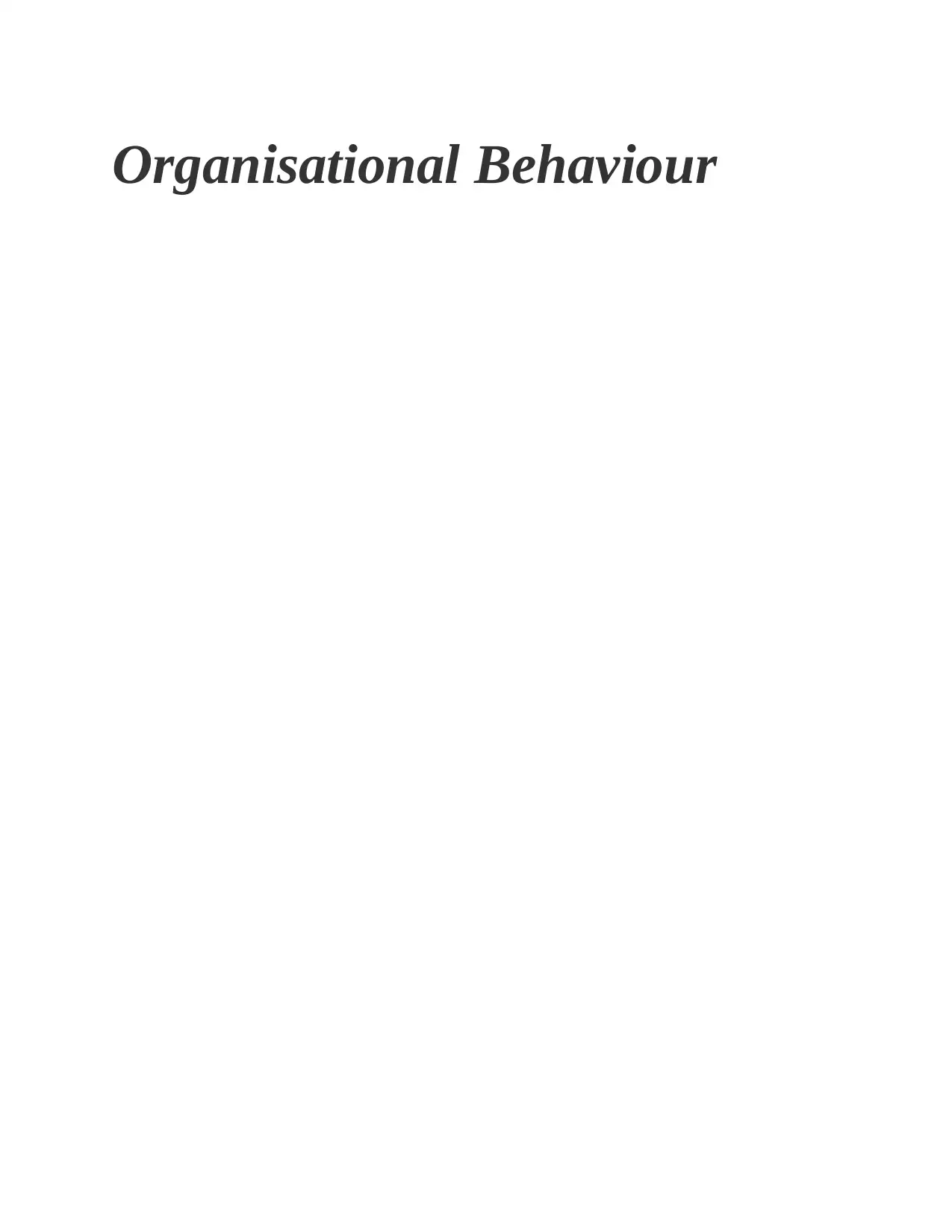
Organisational Behaviour
Paraphrase This Document
Need a fresh take? Get an instant paraphrase of this document with our AI Paraphraser
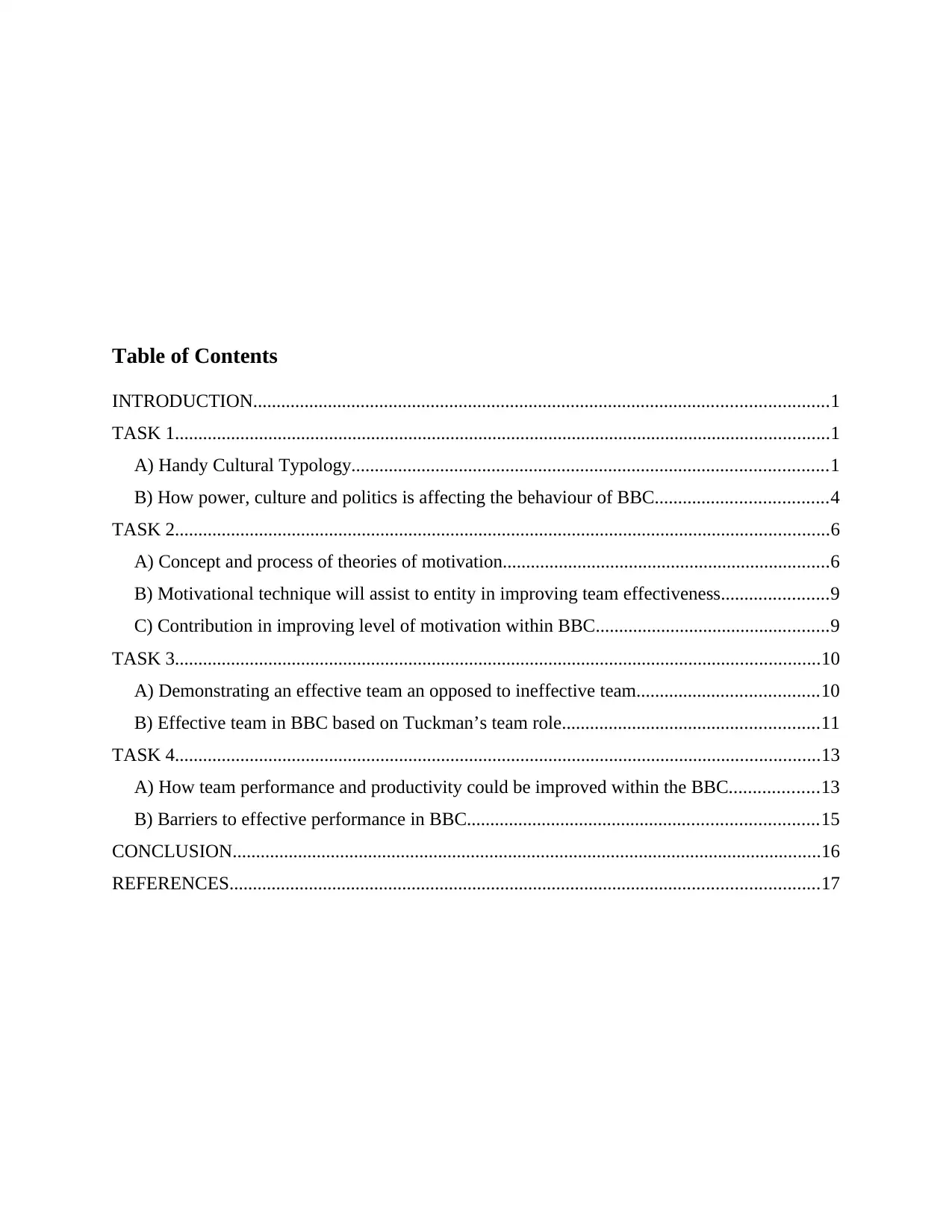
Table of Contents
INTRODUCTION...........................................................................................................................1
TASK 1............................................................................................................................................1
A) Handy Cultural Typology......................................................................................................1
B) How power, culture and politics is affecting the behaviour of BBC.....................................4
TASK 2............................................................................................................................................6
A) Concept and process of theories of motivation......................................................................6
B) Motivational technique will assist to entity in improving team effectiveness.......................9
C) Contribution in improving level of motivation within BBC..................................................9
TASK 3..........................................................................................................................................10
A) Demonstrating an effective team an opposed to ineffective team.......................................10
B) Effective team in BBC based on Tuckman’s team role.......................................................11
TASK 4..........................................................................................................................................13
A) How team performance and productivity could be improved within the BBC...................13
B) Barriers to effective performance in BBC...........................................................................15
CONCLUSION..............................................................................................................................16
REFERENCES..............................................................................................................................17
INTRODUCTION...........................................................................................................................1
TASK 1............................................................................................................................................1
A) Handy Cultural Typology......................................................................................................1
B) How power, culture and politics is affecting the behaviour of BBC.....................................4
TASK 2............................................................................................................................................6
A) Concept and process of theories of motivation......................................................................6
B) Motivational technique will assist to entity in improving team effectiveness.......................9
C) Contribution in improving level of motivation within BBC..................................................9
TASK 3..........................................................................................................................................10
A) Demonstrating an effective team an opposed to ineffective team.......................................10
B) Effective team in BBC based on Tuckman’s team role.......................................................11
TASK 4..........................................................................................................................................13
A) How team performance and productivity could be improved within the BBC...................13
B) Barriers to effective performance in BBC...........................................................................15
CONCLUSION..............................................................................................................................16
REFERENCES..............................................................................................................................17
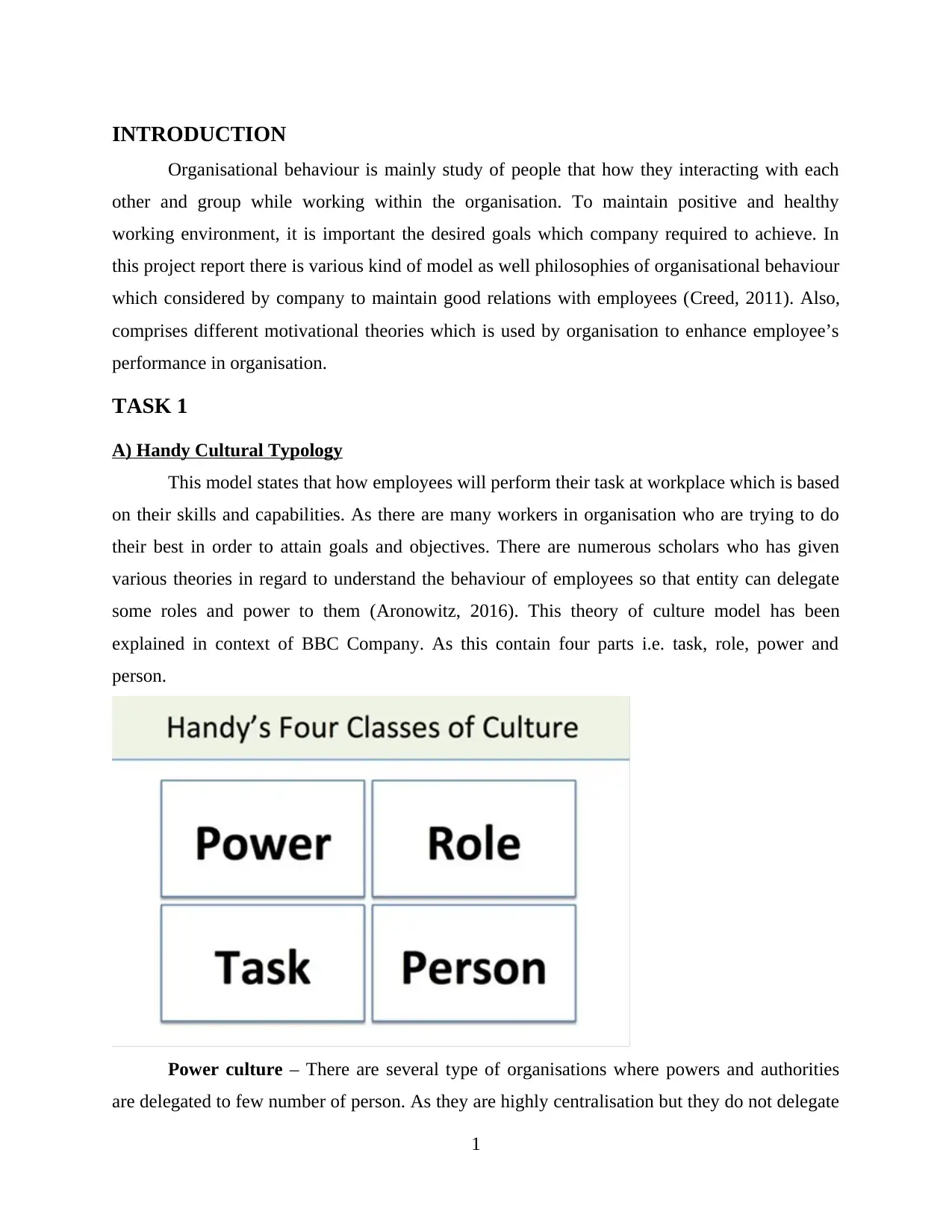
INTRODUCTION
Organisational behaviour is mainly study of people that how they interacting with each
other and group while working within the organisation. To maintain positive and healthy
working environment, it is important the desired goals which company required to achieve. In
this project report there is various kind of model as well philosophies of organisational behaviour
which considered by company to maintain good relations with employees (Creed, 2011). Also,
comprises different motivational theories which is used by organisation to enhance employee’s
performance in organisation.
TASK 1
A) Handy Cultural Typology
This model states that how employees will perform their task at workplace which is based
on their skills and capabilities. As there are many workers in organisation who are trying to do
their best in order to attain goals and objectives. There are numerous scholars who has given
various theories in regard to understand the behaviour of employees so that entity can delegate
some roles and power to them (Aronowitz, 2016). This theory of culture model has been
explained in context of BBC Company. As this contain four parts i.e. task, role, power and
person.
Power culture – There are several type of organisations where powers and authorities
are delegated to few number of person. As they are highly centralisation but they do not delegate
1
Organisational behaviour is mainly study of people that how they interacting with each
other and group while working within the organisation. To maintain positive and healthy
working environment, it is important the desired goals which company required to achieve. In
this project report there is various kind of model as well philosophies of organisational behaviour
which considered by company to maintain good relations with employees (Creed, 2011). Also,
comprises different motivational theories which is used by organisation to enhance employee’s
performance in organisation.
TASK 1
A) Handy Cultural Typology
This model states that how employees will perform their task at workplace which is based
on their skills and capabilities. As there are many workers in organisation who are trying to do
their best in order to attain goals and objectives. There are numerous scholars who has given
various theories in regard to understand the behaviour of employees so that entity can delegate
some roles and power to them (Aronowitz, 2016). This theory of culture model has been
explained in context of BBC Company. As this contain four parts i.e. task, role, power and
person.
Power culture – There are several type of organisations where powers and authorities
are delegated to few number of person. As they are highly centralisation but they do not delegate
1
⊘ This is a preview!⊘
Do you want full access?
Subscribe today to unlock all pages.

Trusted by 1+ million students worldwide
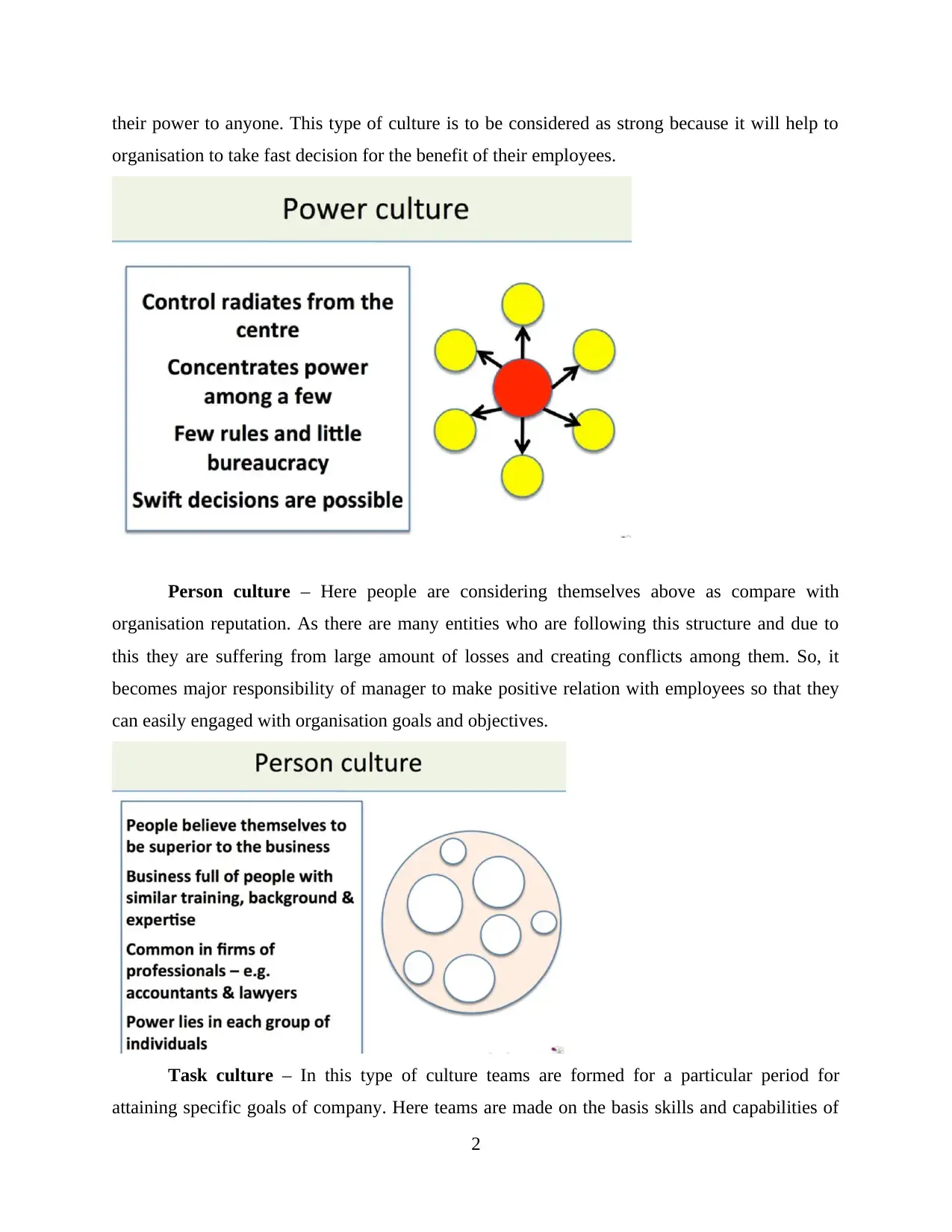
their power to anyone. This type of culture is to be considered as strong because it will help to
organisation to take fast decision for the benefit of their employees.
Person culture – Here people are considering themselves above as compare with
organisation reputation. As there are many entities who are following this structure and due to
this they are suffering from large amount of losses and creating conflicts among them. So, it
becomes major responsibility of manager to make positive relation with employees so that they
can easily engaged with organisation goals and objectives.
Task culture – In this type of culture teams are formed for a particular period for
attaining specific goals of company. Here teams are made on the basis skills and capabilities of
2
organisation to take fast decision for the benefit of their employees.
Person culture – Here people are considering themselves above as compare with
organisation reputation. As there are many entities who are following this structure and due to
this they are suffering from large amount of losses and creating conflicts among them. So, it
becomes major responsibility of manager to make positive relation with employees so that they
can easily engaged with organisation goals and objectives.
Task culture – In this type of culture teams are formed for a particular period for
attaining specific goals of company. Here teams are made on the basis skills and capabilities of
2
Paraphrase This Document
Need a fresh take? Get an instant paraphrase of this document with our AI Paraphraser
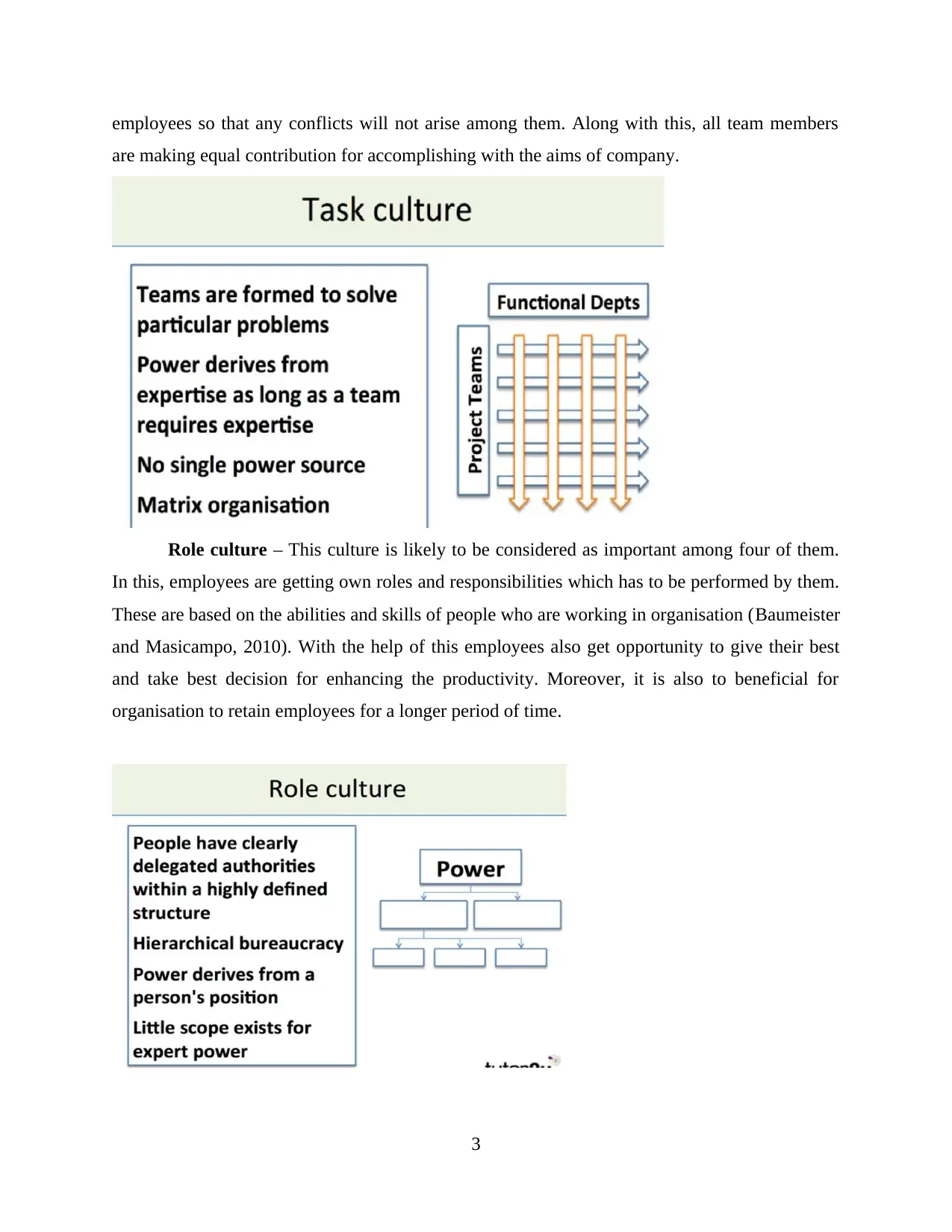
employees so that any conflicts will not arise among them. Along with this, all team members
are making equal contribution for accomplishing with the aims of company.
Role culture – This culture is likely to be considered as important among four of them.
In this, employees are getting own roles and responsibilities which has to be performed by them.
These are based on the abilities and skills of people who are working in organisation (Baumeister
and Masicampo, 2010). With the help of this employees also get opportunity to give their best
and take best decision for enhancing the productivity. Moreover, it is also to beneficial for
organisation to retain employees for a longer period of time.
3
are making equal contribution for accomplishing with the aims of company.
Role culture – This culture is likely to be considered as important among four of them.
In this, employees are getting own roles and responsibilities which has to be performed by them.
These are based on the abilities and skills of people who are working in organisation (Baumeister
and Masicampo, 2010). With the help of this employees also get opportunity to give their best
and take best decision for enhancing the productivity. Moreover, it is also to beneficial for
organisation to retain employees for a longer period of time.
3
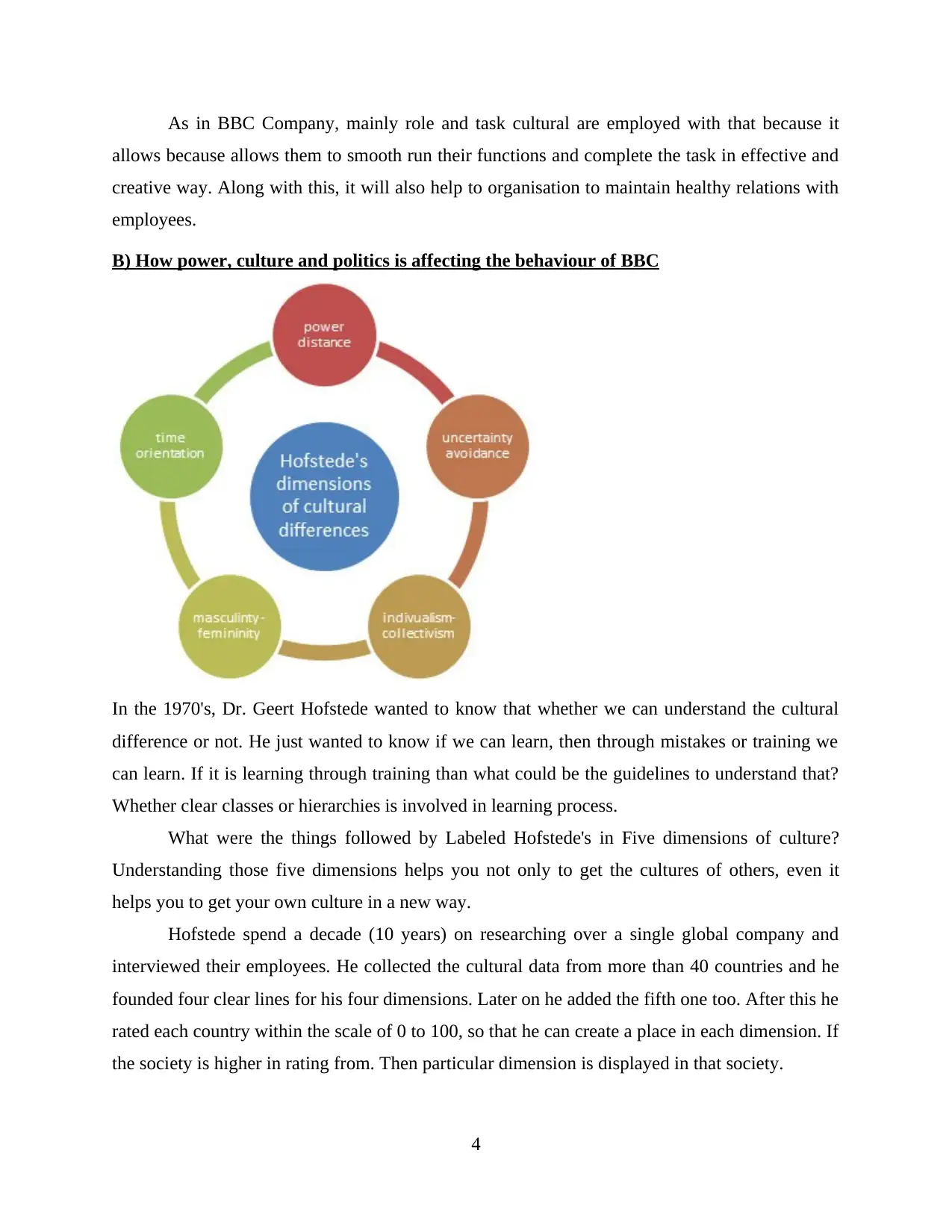
As in BBC Company, mainly role and task cultural are employed with that because it
allows because allows them to smooth run their functions and complete the task in effective and
creative way. Along with this, it will also help to organisation to maintain healthy relations with
employees.
B) How power, culture and politics is affecting the behaviour of BBC
In the 1970's, Dr. Geert Hofstede wanted to know that whether we can understand the cultural
difference or not. He just wanted to know if we can learn, then through mistakes or training we
can learn. If it is learning through training than what could be the guidelines to understand that?
Whether clear classes or hierarchies is involved in learning process.
What were the things followed by Labeled Hofstede's in Five dimensions of culture?
Understanding those five dimensions helps you not only to get the cultures of others, even it
helps you to get your own culture in a new way.
Hofstede spend a decade (10 years) on researching over a single global company and
interviewed their employees. He collected the cultural data from more than 40 countries and he
founded four clear lines for his four dimensions. Later on he added the fifth one too. After this he
rated each country within the scale of 0 to 100, so that he can create a place in each dimension. If
the society is higher in rating from. Then particular dimension is displayed in that society.
4
allows because allows them to smooth run their functions and complete the task in effective and
creative way. Along with this, it will also help to organisation to maintain healthy relations with
employees.
B) How power, culture and politics is affecting the behaviour of BBC
In the 1970's, Dr. Geert Hofstede wanted to know that whether we can understand the cultural
difference or not. He just wanted to know if we can learn, then through mistakes or training we
can learn. If it is learning through training than what could be the guidelines to understand that?
Whether clear classes or hierarchies is involved in learning process.
What were the things followed by Labeled Hofstede's in Five dimensions of culture?
Understanding those five dimensions helps you not only to get the cultures of others, even it
helps you to get your own culture in a new way.
Hofstede spend a decade (10 years) on researching over a single global company and
interviewed their employees. He collected the cultural data from more than 40 countries and he
founded four clear lines for his four dimensions. Later on he added the fifth one too. After this he
rated each country within the scale of 0 to 100, so that he can create a place in each dimension. If
the society is higher in rating from. Then particular dimension is displayed in that society.
4
⊘ This is a preview!⊘
Do you want full access?
Subscribe today to unlock all pages.

Trusted by 1+ million students worldwide
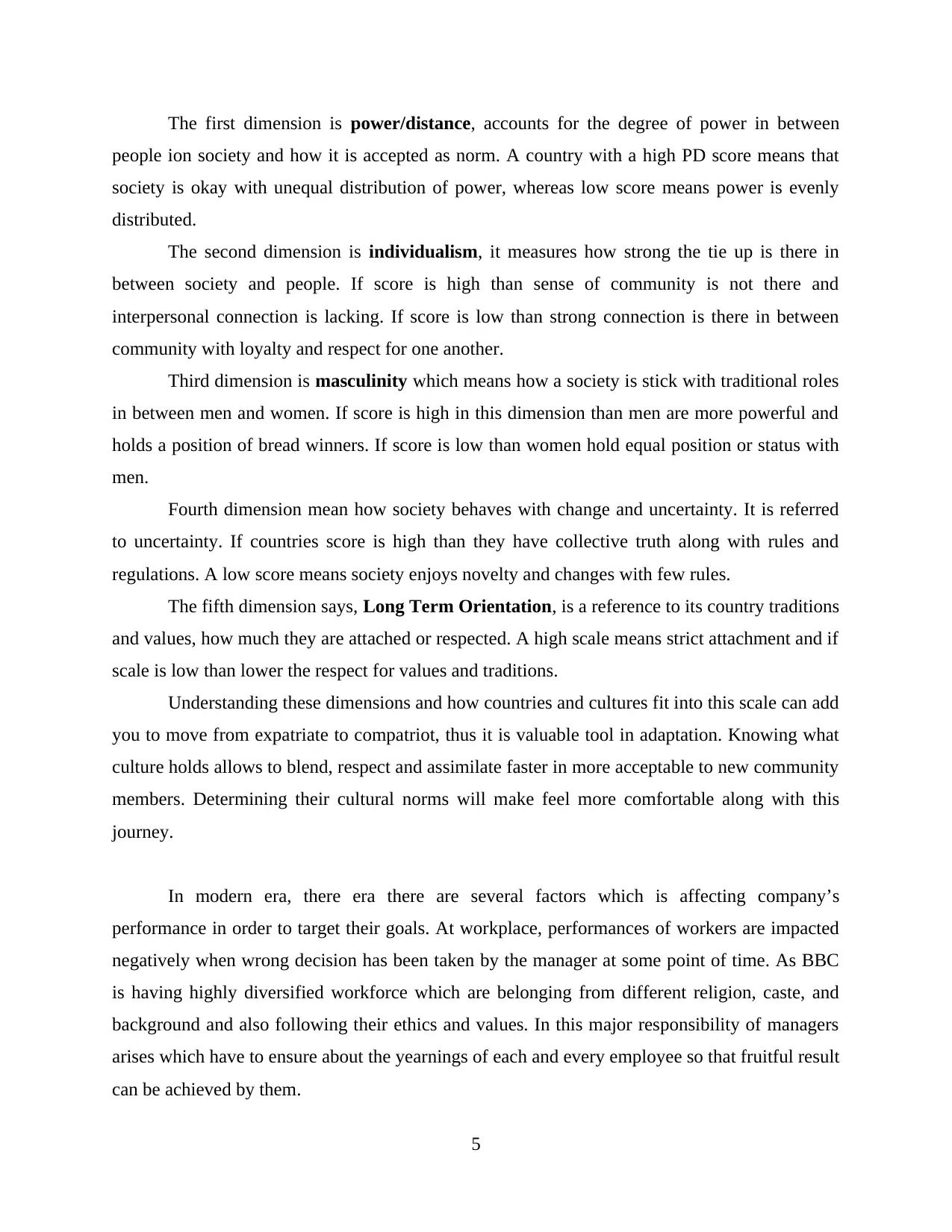
The first dimension is power/distance, accounts for the degree of power in between
people ion society and how it is accepted as norm. A country with a high PD score means that
society is okay with unequal distribution of power, whereas low score means power is evenly
distributed.
The second dimension is individualism, it measures how strong the tie up is there in
between society and people. If score is high than sense of community is not there and
interpersonal connection is lacking. If score is low than strong connection is there in between
community with loyalty and respect for one another.
Third dimension is masculinity which means how a society is stick with traditional roles
in between men and women. If score is high in this dimension than men are more powerful and
holds a position of bread winners. If score is low than women hold equal position or status with
men.
Fourth dimension mean how society behaves with change and uncertainty. It is referred
to uncertainty. If countries score is high than they have collective truth along with rules and
regulations. A low score means society enjoys novelty and changes with few rules.
The fifth dimension says, Long Term Orientation, is a reference to its country traditions
and values, how much they are attached or respected. A high scale means strict attachment and if
scale is low than lower the respect for values and traditions.
Understanding these dimensions and how countries and cultures fit into this scale can add
you to move from expatriate to compatriot, thus it is valuable tool in adaptation. Knowing what
culture holds allows to blend, respect and assimilate faster in more acceptable to new community
members. Determining their cultural norms will make feel more comfortable along with this
journey.
In modern era, there era there are several factors which is affecting company’s
performance in order to target their goals. At workplace, performances of workers are impacted
negatively when wrong decision has been taken by the manager at some point of time. As BBC
is having highly diversified workforce which are belonging from different religion, caste, and
background and also following their ethics and values. In this major responsibility of managers
arises which have to ensure about the yearnings of each and every employee so that fruitful result
can be achieved by them.
5
people ion society and how it is accepted as norm. A country with a high PD score means that
society is okay with unequal distribution of power, whereas low score means power is evenly
distributed.
The second dimension is individualism, it measures how strong the tie up is there in
between society and people. If score is high than sense of community is not there and
interpersonal connection is lacking. If score is low than strong connection is there in between
community with loyalty and respect for one another.
Third dimension is masculinity which means how a society is stick with traditional roles
in between men and women. If score is high in this dimension than men are more powerful and
holds a position of bread winners. If score is low than women hold equal position or status with
men.
Fourth dimension mean how society behaves with change and uncertainty. It is referred
to uncertainty. If countries score is high than they have collective truth along with rules and
regulations. A low score means society enjoys novelty and changes with few rules.
The fifth dimension says, Long Term Orientation, is a reference to its country traditions
and values, how much they are attached or respected. A high scale means strict attachment and if
scale is low than lower the respect for values and traditions.
Understanding these dimensions and how countries and cultures fit into this scale can add
you to move from expatriate to compatriot, thus it is valuable tool in adaptation. Knowing what
culture holds allows to blend, respect and assimilate faster in more acceptable to new community
members. Determining their cultural norms will make feel more comfortable along with this
journey.
In modern era, there era there are several factors which is affecting company’s
performance in order to target their goals. At workplace, performances of workers are impacted
negatively when wrong decision has been taken by the manager at some point of time. As BBC
is having highly diversified workforce which are belonging from different religion, caste, and
background and also following their ethics and values. In this major responsibility of managers
arises which have to ensure about the yearnings of each and every employee so that fruitful result
can be achieved by them.
5
Paraphrase This Document
Need a fresh take? Get an instant paraphrase of this document with our AI Paraphraser
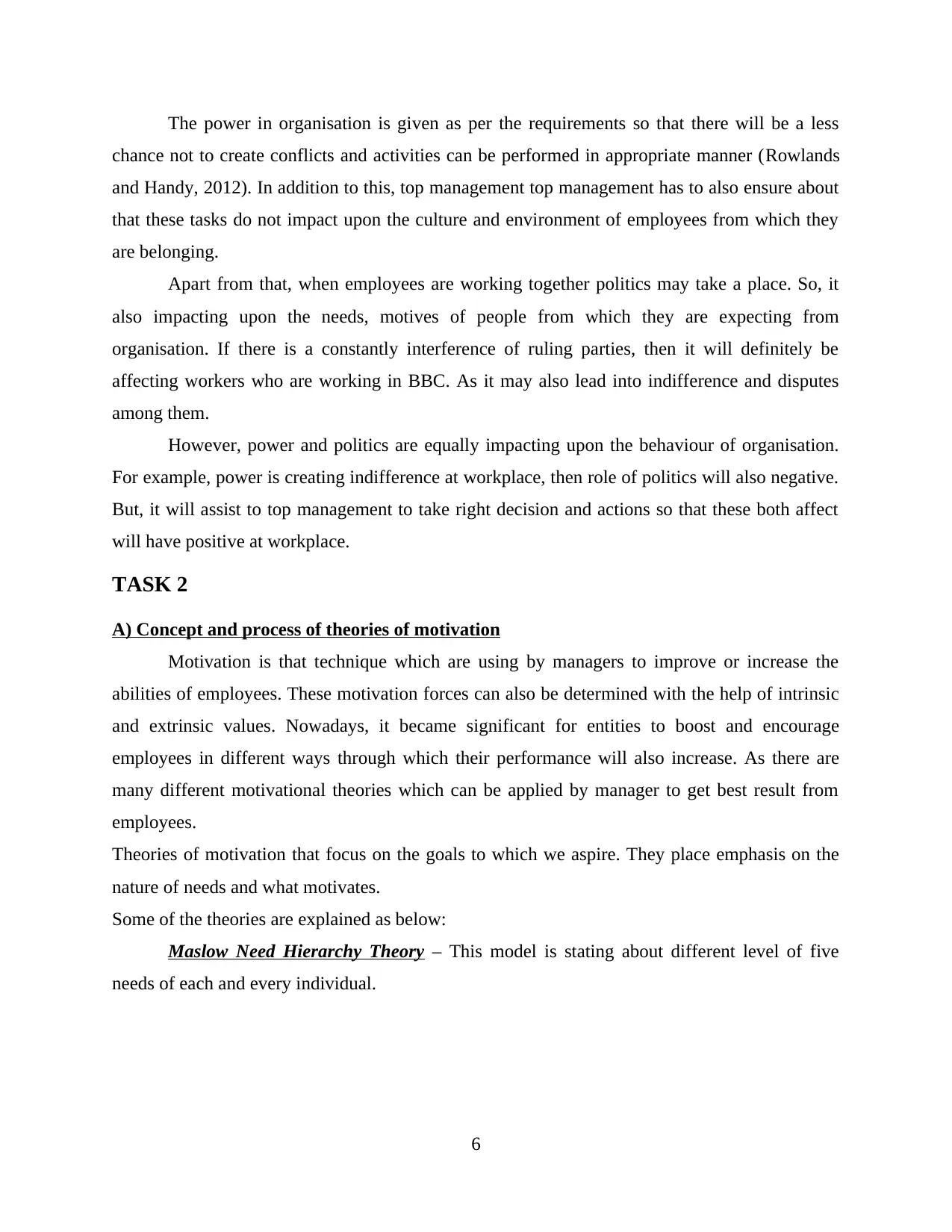
The power in organisation is given as per the requirements so that there will be a less
chance not to create conflicts and activities can be performed in appropriate manner (Rowlands
and Handy, 2012). In addition to this, top management top management has to also ensure about
that these tasks do not impact upon the culture and environment of employees from which they
are belonging.
Apart from that, when employees are working together politics may take a place. So, it
also impacting upon the needs, motives of people from which they are expecting from
organisation. If there is a constantly interference of ruling parties, then it will definitely be
affecting workers who are working in BBC. As it may also lead into indifference and disputes
among them.
However, power and politics are equally impacting upon the behaviour of organisation.
For example, power is creating indifference at workplace, then role of politics will also negative.
But, it will assist to top management to take right decision and actions so that these both affect
will have positive at workplace.
TASK 2
A) Concept and process of theories of motivation
Motivation is that technique which are using by managers to improve or increase the
abilities of employees. These motivation forces can also be determined with the help of intrinsic
and extrinsic values. Nowadays, it became significant for entities to boost and encourage
employees in different ways through which their performance will also increase. As there are
many different motivational theories which can be applied by manager to get best result from
employees.
Theories of motivation that focus on the goals to which we aspire. They place emphasis on the
nature of needs and what motivates.
Some of the theories are explained as below:
Maslow Need Hierarchy Theory – This model is stating about different level of five
needs of each and every individual.
6
chance not to create conflicts and activities can be performed in appropriate manner (Rowlands
and Handy, 2012). In addition to this, top management top management has to also ensure about
that these tasks do not impact upon the culture and environment of employees from which they
are belonging.
Apart from that, when employees are working together politics may take a place. So, it
also impacting upon the needs, motives of people from which they are expecting from
organisation. If there is a constantly interference of ruling parties, then it will definitely be
affecting workers who are working in BBC. As it may also lead into indifference and disputes
among them.
However, power and politics are equally impacting upon the behaviour of organisation.
For example, power is creating indifference at workplace, then role of politics will also negative.
But, it will assist to top management to take right decision and actions so that these both affect
will have positive at workplace.
TASK 2
A) Concept and process of theories of motivation
Motivation is that technique which are using by managers to improve or increase the
abilities of employees. These motivation forces can also be determined with the help of intrinsic
and extrinsic values. Nowadays, it became significant for entities to boost and encourage
employees in different ways through which their performance will also increase. As there are
many different motivational theories which can be applied by manager to get best result from
employees.
Theories of motivation that focus on the goals to which we aspire. They place emphasis on the
nature of needs and what motivates.
Some of the theories are explained as below:
Maslow Need Hierarchy Theory – This model is stating about different level of five
needs of each and every individual.
6
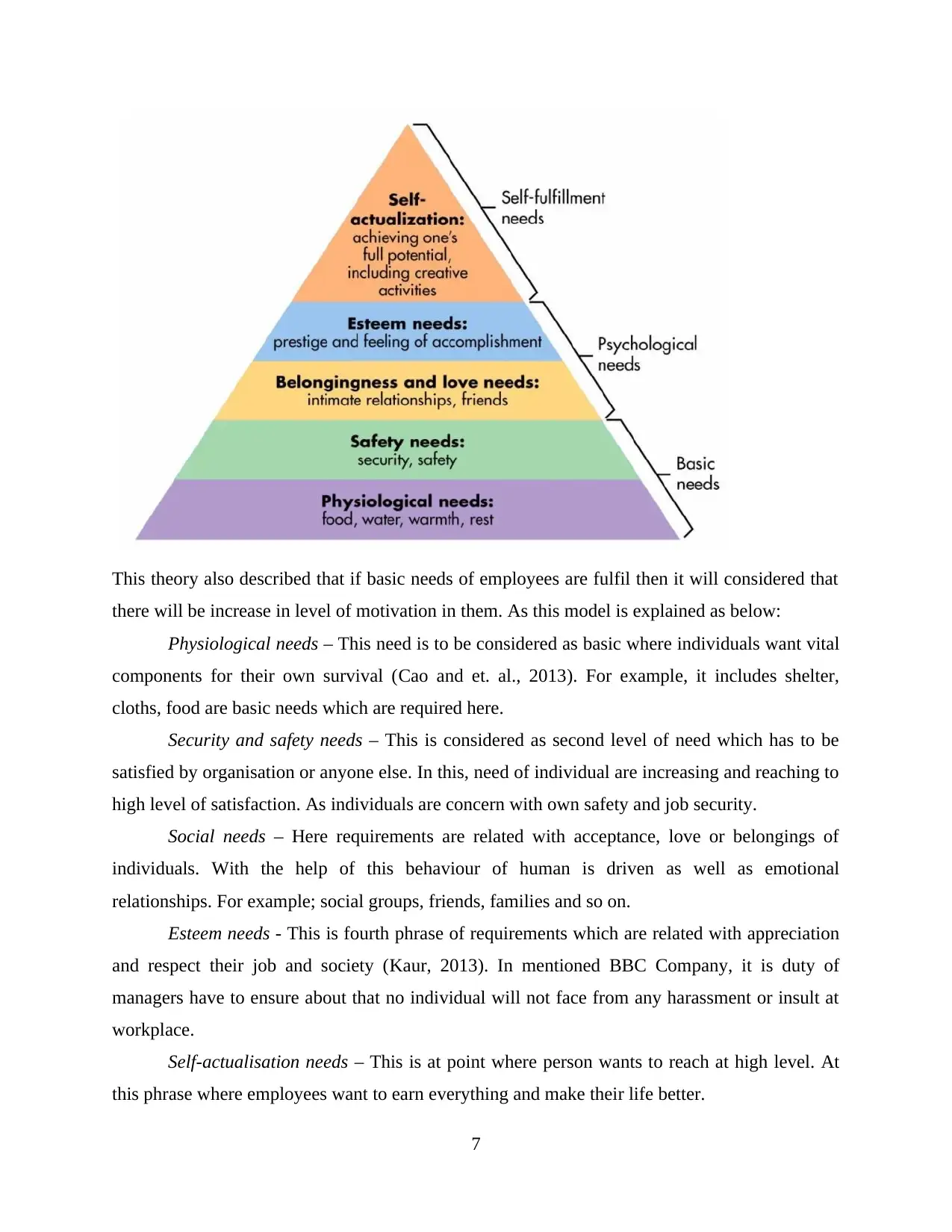
This theory also described that if basic needs of employees are fulfil then it will considered that
there will be increase in level of motivation in them. As this model is explained as below:
Physiological needs – This need is to be considered as basic where individuals want vital
components for their own survival (Cao and et. al., 2013). For example, it includes shelter,
cloths, food are basic needs which are required here.
Security and safety needs – This is considered as second level of need which has to be
satisfied by organisation or anyone else. In this, need of individual are increasing and reaching to
high level of satisfaction. As individuals are concern with own safety and job security.
Social needs – Here requirements are related with acceptance, love or belongings of
individuals. With the help of this behaviour of human is driven as well as emotional
relationships. For example; social groups, friends, families and so on.
Esteem needs - This is fourth phrase of requirements which are related with appreciation
and respect their job and society (Kaur, 2013). In mentioned BBC Company, it is duty of
managers have to ensure about that no individual will not face from any harassment or insult at
workplace.
Self-actualisation needs – This is at point where person wants to reach at high level. At
this phrase where employees want to earn everything and make their life better.
7
there will be increase in level of motivation in them. As this model is explained as below:
Physiological needs – This need is to be considered as basic where individuals want vital
components for their own survival (Cao and et. al., 2013). For example, it includes shelter,
cloths, food are basic needs which are required here.
Security and safety needs – This is considered as second level of need which has to be
satisfied by organisation or anyone else. In this, need of individual are increasing and reaching to
high level of satisfaction. As individuals are concern with own safety and job security.
Social needs – Here requirements are related with acceptance, love or belongings of
individuals. With the help of this behaviour of human is driven as well as emotional
relationships. For example; social groups, friends, families and so on.
Esteem needs - This is fourth phrase of requirements which are related with appreciation
and respect their job and society (Kaur, 2013). In mentioned BBC Company, it is duty of
managers have to ensure about that no individual will not face from any harassment or insult at
workplace.
Self-actualisation needs – This is at point where person wants to reach at high level. At
this phrase where employees want to earn everything and make their life better.
7
⊘ This is a preview!⊘
Do you want full access?
Subscribe today to unlock all pages.

Trusted by 1+ million students worldwide
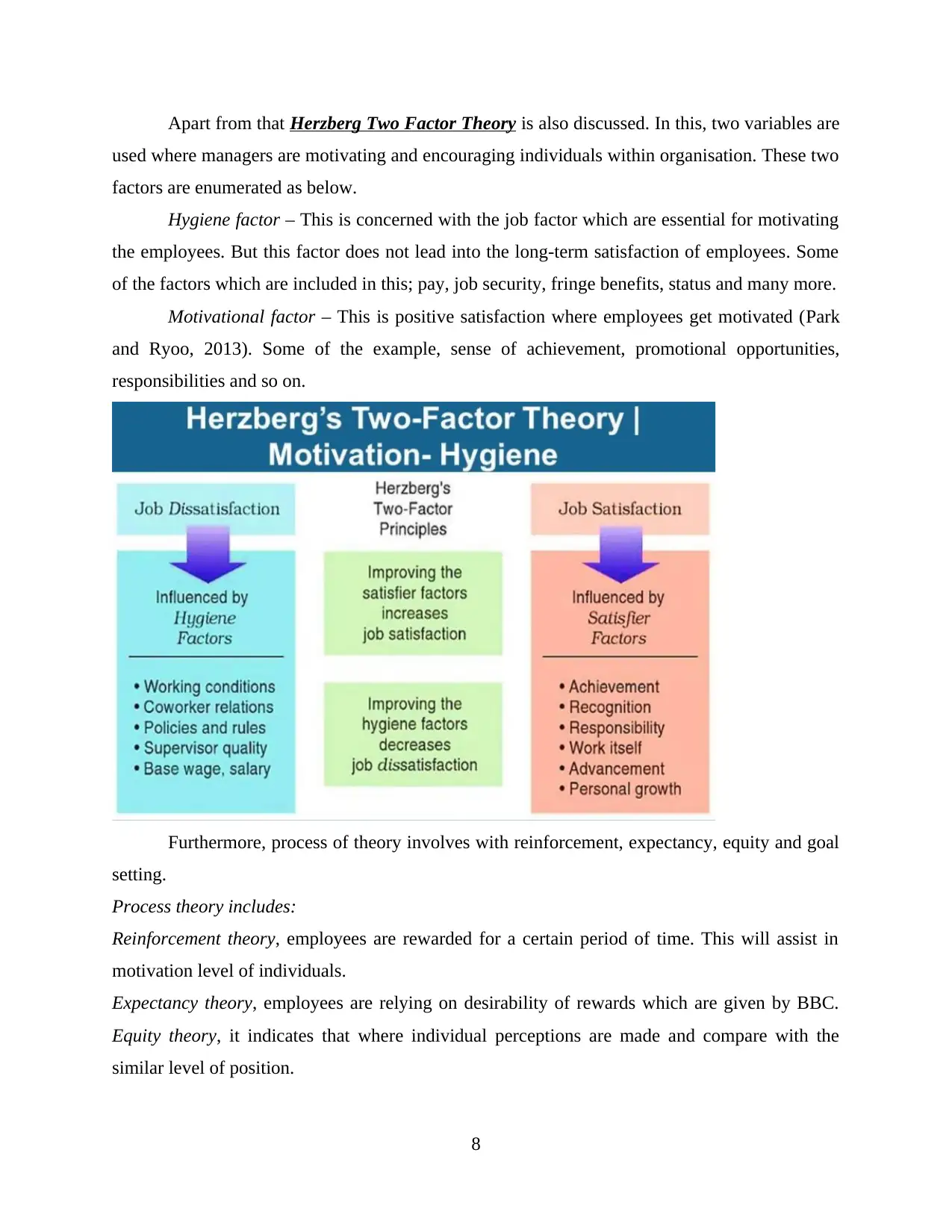
Apart from that Herzberg Two Factor Theory is also discussed. In this, two variables are
used where managers are motivating and encouraging individuals within organisation. These two
factors are enumerated as below.
Hygiene factor – This is concerned with the job factor which are essential for motivating
the employees. But this factor does not lead into the long-term satisfaction of employees. Some
of the factors which are included in this; pay, job security, fringe benefits, status and many more.
Motivational factor – This is positive satisfaction where employees get motivated (Park
and Ryoo, 2013). Some of the example, sense of achievement, promotional opportunities,
responsibilities and so on.
Furthermore, process of theory involves with reinforcement, expectancy, equity and goal
setting.
Process theory includes:
Reinforcement theory, employees are rewarded for a certain period of time. This will assist in
motivation level of individuals.
Expectancy theory, employees are relying on desirability of rewards which are given by BBC.
Equity theory, it indicates that where individual perceptions are made and compare with the
similar level of position.
8
used where managers are motivating and encouraging individuals within organisation. These two
factors are enumerated as below.
Hygiene factor – This is concerned with the job factor which are essential for motivating
the employees. But this factor does not lead into the long-term satisfaction of employees. Some
of the factors which are included in this; pay, job security, fringe benefits, status and many more.
Motivational factor – This is positive satisfaction where employees get motivated (Park
and Ryoo, 2013). Some of the example, sense of achievement, promotional opportunities,
responsibilities and so on.
Furthermore, process of theory involves with reinforcement, expectancy, equity and goal
setting.
Process theory includes:
Reinforcement theory, employees are rewarded for a certain period of time. This will assist in
motivation level of individuals.
Expectancy theory, employees are relying on desirability of rewards which are given by BBC.
Equity theory, it indicates that where individual perceptions are made and compare with the
similar level of position.
8
Paraphrase This Document
Need a fresh take? Get an instant paraphrase of this document with our AI Paraphraser
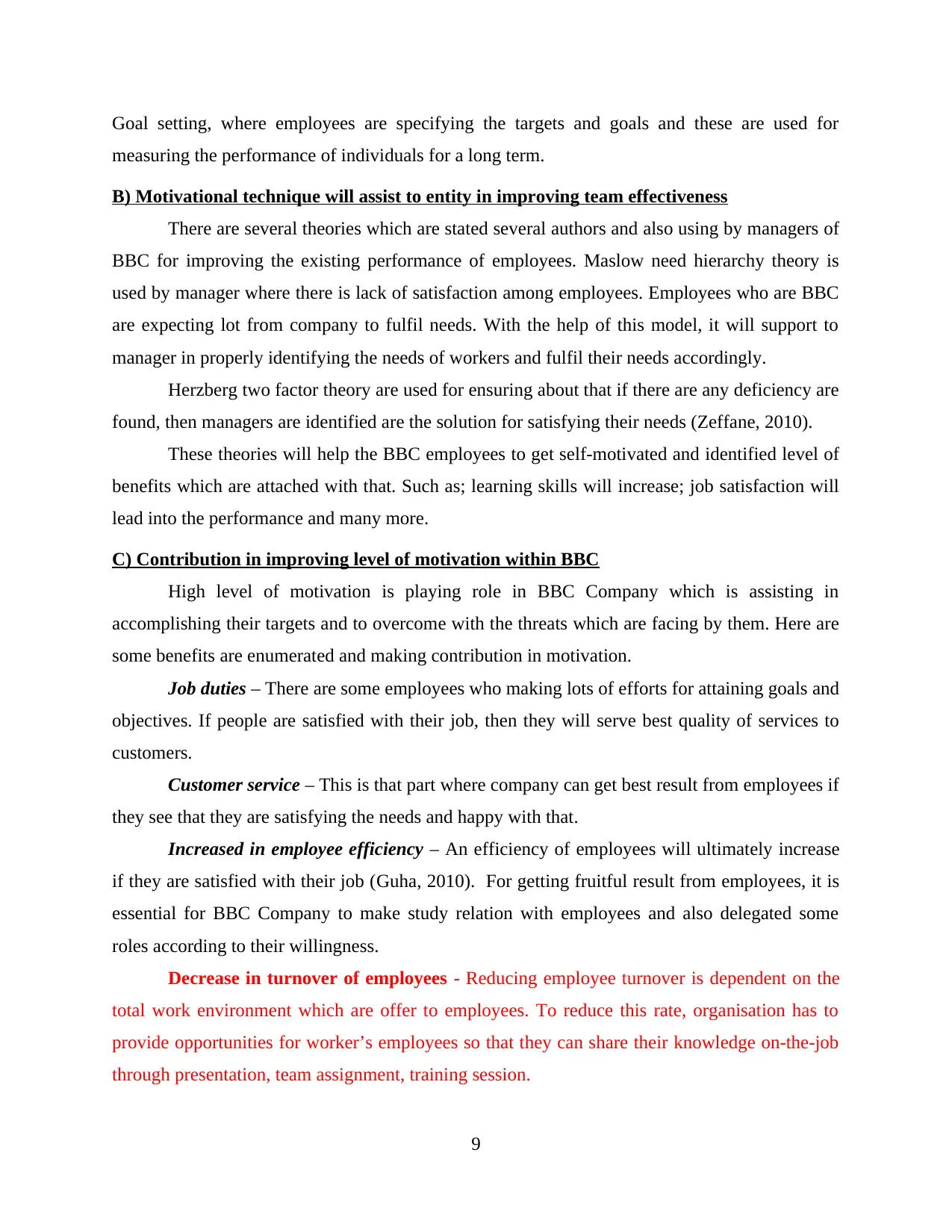
Goal setting, where employees are specifying the targets and goals and these are used for
measuring the performance of individuals for a long term.
B) Motivational technique will assist to entity in improving team effectiveness
There are several theories which are stated several authors and also using by managers of
BBC for improving the existing performance of employees. Maslow need hierarchy theory is
used by manager where there is lack of satisfaction among employees. Employees who are BBC
are expecting lot from company to fulfil needs. With the help of this model, it will support to
manager in properly identifying the needs of workers and fulfil their needs accordingly.
Herzberg two factor theory are used for ensuring about that if there are any deficiency are
found, then managers are identified are the solution for satisfying their needs (Zeffane, 2010).
These theories will help the BBC employees to get self-motivated and identified level of
benefits which are attached with that. Such as; learning skills will increase; job satisfaction will
lead into the performance and many more.
C) Contribution in improving level of motivation within BBC
High level of motivation is playing role in BBC Company which is assisting in
accomplishing their targets and to overcome with the threats which are facing by them. Here are
some benefits are enumerated and making contribution in motivation.
Job duties – There are some employees who making lots of efforts for attaining goals and
objectives. If people are satisfied with their job, then they will serve best quality of services to
customers.
Customer service – This is that part where company can get best result from employees if
they see that they are satisfying the needs and happy with that.
Increased in employee efficiency – An efficiency of employees will ultimately increase
if they are satisfied with their job (Guha, 2010). For getting fruitful result from employees, it is
essential for BBC Company to make study relation with employees and also delegated some
roles according to their willingness.
Decrease in turnover of employees - Reducing employee turnover is dependent on the
total work environment which are offer to employees. To reduce this rate, organisation has to
provide opportunities for worker’s employees so that they can share their knowledge on-the-job
through presentation, team assignment, training session.
9
measuring the performance of individuals for a long term.
B) Motivational technique will assist to entity in improving team effectiveness
There are several theories which are stated several authors and also using by managers of
BBC for improving the existing performance of employees. Maslow need hierarchy theory is
used by manager where there is lack of satisfaction among employees. Employees who are BBC
are expecting lot from company to fulfil needs. With the help of this model, it will support to
manager in properly identifying the needs of workers and fulfil their needs accordingly.
Herzberg two factor theory are used for ensuring about that if there are any deficiency are
found, then managers are identified are the solution for satisfying their needs (Zeffane, 2010).
These theories will help the BBC employees to get self-motivated and identified level of
benefits which are attached with that. Such as; learning skills will increase; job satisfaction will
lead into the performance and many more.
C) Contribution in improving level of motivation within BBC
High level of motivation is playing role in BBC Company which is assisting in
accomplishing their targets and to overcome with the threats which are facing by them. Here are
some benefits are enumerated and making contribution in motivation.
Job duties – There are some employees who making lots of efforts for attaining goals and
objectives. If people are satisfied with their job, then they will serve best quality of services to
customers.
Customer service – This is that part where company can get best result from employees if
they see that they are satisfying the needs and happy with that.
Increased in employee efficiency – An efficiency of employees will ultimately increase
if they are satisfied with their job (Guha, 2010). For getting fruitful result from employees, it is
essential for BBC Company to make study relation with employees and also delegated some
roles according to their willingness.
Decrease in turnover of employees - Reducing employee turnover is dependent on the
total work environment which are offer to employees. To reduce this rate, organisation has to
provide opportunities for worker’s employees so that they can share their knowledge on-the-job
through presentation, team assignment, training session.
9
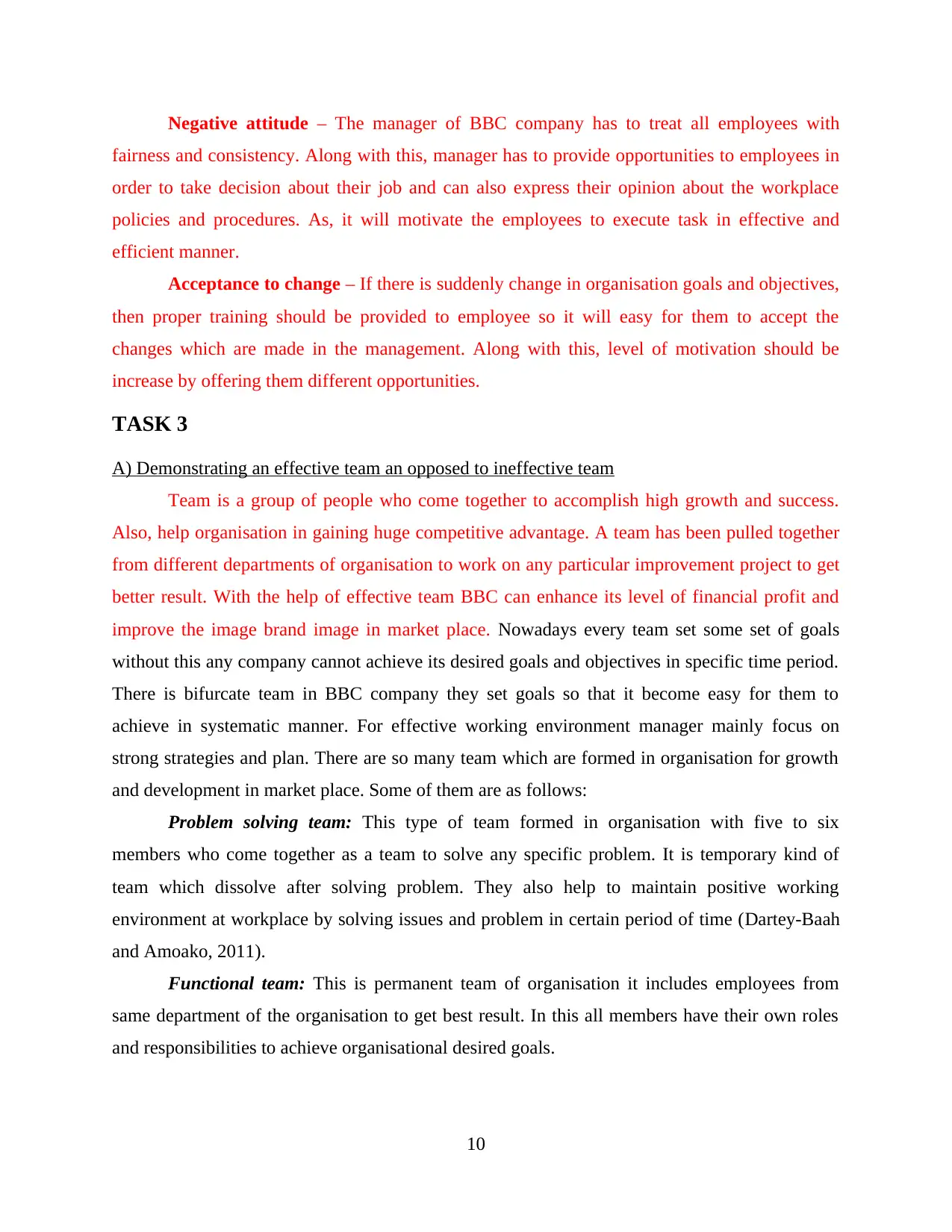
Negative attitude – The manager of BBC company has to treat all employees with
fairness and consistency. Along with this, manager has to provide opportunities to employees in
order to take decision about their job and can also express their opinion about the workplace
policies and procedures. As, it will motivate the employees to execute task in effective and
efficient manner.
Acceptance to change – If there is suddenly change in organisation goals and objectives,
then proper training should be provided to employee so it will easy for them to accept the
changes which are made in the management. Along with this, level of motivation should be
increase by offering them different opportunities.
TASK 3
A) Demonstrating an effective team an opposed to ineffective team
Team is a group of people who come together to accomplish high growth and success.
Also, help organisation in gaining huge competitive advantage. A team has been pulled together
from different departments of organisation to work on any particular improvement project to get
better result. With the help of effective team BBC can enhance its level of financial profit and
improve the image brand image in market place. Nowadays every team set some set of goals
without this any company cannot achieve its desired goals and objectives in specific time period.
There is bifurcate team in BBC company they set goals so that it become easy for them to
achieve in systematic manner. For effective working environment manager mainly focus on
strong strategies and plan. There are so many team which are formed in organisation for growth
and development in market place. Some of them are as follows:
Problem solving team: This type of team formed in organisation with five to six
members who come together as a team to solve any specific problem. It is temporary kind of
team which dissolve after solving problem. They also help to maintain positive working
environment at workplace by solving issues and problem in certain period of time (Dartey-Baah
and Amoako, 2011).
Functional team: This is permanent team of organisation it includes employees from
same department of the organisation to get best result. In this all members have their own roles
and responsibilities to achieve organisational desired goals.
10
fairness and consistency. Along with this, manager has to provide opportunities to employees in
order to take decision about their job and can also express their opinion about the workplace
policies and procedures. As, it will motivate the employees to execute task in effective and
efficient manner.
Acceptance to change – If there is suddenly change in organisation goals and objectives,
then proper training should be provided to employee so it will easy for them to accept the
changes which are made in the management. Along with this, level of motivation should be
increase by offering them different opportunities.
TASK 3
A) Demonstrating an effective team an opposed to ineffective team
Team is a group of people who come together to accomplish high growth and success.
Also, help organisation in gaining huge competitive advantage. A team has been pulled together
from different departments of organisation to work on any particular improvement project to get
better result. With the help of effective team BBC can enhance its level of financial profit and
improve the image brand image in market place. Nowadays every team set some set of goals
without this any company cannot achieve its desired goals and objectives in specific time period.
There is bifurcate team in BBC company they set goals so that it become easy for them to
achieve in systematic manner. For effective working environment manager mainly focus on
strong strategies and plan. There are so many team which are formed in organisation for growth
and development in market place. Some of them are as follows:
Problem solving team: This type of team formed in organisation with five to six
members who come together as a team to solve any specific problem. It is temporary kind of
team which dissolve after solving problem. They also help to maintain positive working
environment at workplace by solving issues and problem in certain period of time (Dartey-Baah
and Amoako, 2011).
Functional team: This is permanent team of organisation it includes employees from
same department of the organisation to get best result. In this all members have their own roles
and responsibilities to achieve organisational desired goals.
10
⊘ This is a preview!⊘
Do you want full access?
Subscribe today to unlock all pages.

Trusted by 1+ million students worldwide
1 out of 22
Related Documents
Your All-in-One AI-Powered Toolkit for Academic Success.
+13062052269
info@desklib.com
Available 24*7 on WhatsApp / Email
![[object Object]](/_next/static/media/star-bottom.7253800d.svg)
Unlock your academic potential
Copyright © 2020–2026 A2Z Services. All Rights Reserved. Developed and managed by ZUCOL.





